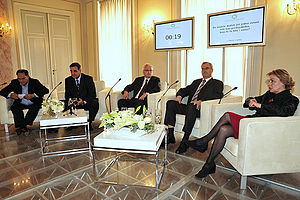Andrija Hebrang (son)
| Andrija Hebrang | |
|---|---|

Andrija Hebrang (fourth from the left)
|
|
| Minister of Health and Social Welfare |
|
|
In office 23 December 2003 – 25 February 2005 |
|
| Prime Minister | Ivo Sanader |
| Preceded by | Andro Vlahušić |
| Succeeded by | Neven Ljubičić |
| 6th Minister of Defence of Croatia | |
|
In office 14 May 1998 – 12 October 1998 |
|
| Prime Minister | Zlatko Mateša |
| Preceded by | Gojko Šušak |
| Succeeded by | Pavao Miljavac |
| Minister of Health | |
|
In office 12 October 1993 – 14 May 1998 |
|
| Prime Minister |
Nikica Valentić (1993–1995) Zlatko Mateša (1995–1998) |
| Preceded by | Juraj Njavro |
| Succeeded by | Željko Reiner |
|
In office 30 May 1990 – 12 August 1992 |
|
| Prime Minister |
Stjepan Mesić (1990) Josip Manolić (1990–1991) Franjo Gregurić (1991–1992) |
| Preceded by | Office established |
| Succeeded by | Juraj Njavro |
| Personal details | |
| Born |
27 January 1946 Belgrade, Yugoslavia |
| Nationality | Croat |
| Political party | Croatian Democratic Union, Croatian True Revival (2000-2001) |
| Spouse(s) | Danijela Vrhovski |
| Children | 3 |
| Residence | Zagreb |
| Alma mater |
University of Zagreb (School of Medicine) |
| Occupation | physician |
| Religion | Roman Catholicism |
Andrija Hebrang (Croatian pronunciation: [ˈandrija ˈxebraŋk]; born 27 January 1946) is a Croatian physician and politician. A member of the Croatian Democratic Union (HDZ), he is currently member of the Croatian Parliament. A physician by vocation, Hebrang had served three terms as Croatia's Minister of Health (1990–1992, 1993–1998 and 2003–2005) and spent three months as Minister of Defence (May–October 1998) under six different Prime Ministers. In addition, he was his party's candidate in the 2009–2010 Croatian presidential election, eventually finishing third behind Ivo Josipović and Milan Bandić, winning 12 percent of the vote in the first round.
Andrija Hebrang was born in Belgrade, Yugoslavia (now Serbia), to Andrija Hebrang, a prominent Croatian-Yugoslav politician and Olga Strauss, who came from a well-to-do Pakrac Jewish family. Her parents saw to her education, and she learned to play piano, and to speak French and German. Hebrang father joined the Communist party and fought for the Partisans in World War II, becoming a close friend and adviser to Marshall Josip Broz Tito, eventually becoming a high ranking government member. However, in the late 1940s he fell out of favor with senior Party members, was arrested for treason by the Yugoslav government, and subsequently disappeared. The date of his death and the circumstances are unknown, though it is presumed he died ca. 1949 in a Belgrade prison; the circumstances remain unclear and his body was never recovered. Ustaše killed 16 members of Hebrang family during the Holocaust and another 10 members of his family have been killed by the communist regime of newly founded SFR Yugoslavia.
...
Wikipedia
